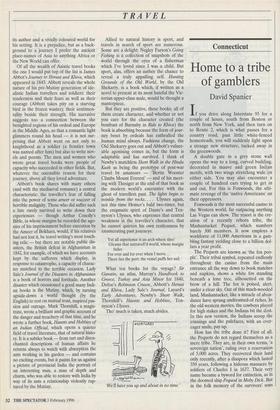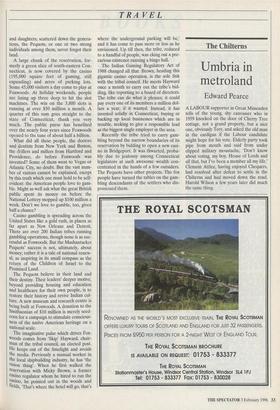Connecticut
Home to a tribe of gamblers
David Spanier
If you drive along Interstate 95 for a couple of hours, south from Boston or north from New York, and then turn on to Route 2, which is what passes for a country road, past little white-fenced homesteads, you will suddenly light upon a strange new structure, tucked away in the greenwoods.
A double gate in a grey stone wall opens the way to a long, curved building, decorated in mauve and green Indian motifs, with two wings stretching wide on either side. You may also encounter a couple of hundred cars trying to get in and out. For this is Foxwoods, the ulti- mate revenge of the 'native Americans' on their oppressors.
Foxwoods is the most successful casino in the Western world, far outpacing anything Las Vegas can show. The resort is the cre- ation of a recently reborn tribe, the Mashantucket Pequot, which numbers barely 300 members. It now employs a workforce of 11,000 Americans in a gam- bling fantasy yielding close to a billion dol- lars a year profit.
The Pequots are known as 'the fox peo- ple'. Their tribal symbol, repeated endlessly throughout the casino from the main entrance all the way down to book matches and napkins, shows a white fox standing beneath a lone tree, silhouetted on the brow of a hill. The fox is poised, alert, under a clear sky. Out of this much-wooded land, Mashantucket, like a miracle of abun- dance have sprung undreamed-of riches. In the old western movies, the cowboys played for high stakes and the Indians bit the dust. In this new version, the Indians scoop the winnings and the palefaces, with an ever- eager smile, pay up.
How has the tribe done it? First of all, the Pequots do not regard themselves as a mere tribe. They are, in their own terms, 'a sovereign nation', ruling over a reservation of 5,000 acres. They recovered their land only recently, after a diaspora which lasted 350 years, following a hideous massacre by soldiers of Charles I in 1637. Their very name became a byword for extinction, as in the doomed ship Pequod in Moby Dick. But in the folk memory of the survivors' sons and daughters, scattered down the genera- tions, the Pequots, or one or two strong individuals among them, never forgot their land.
A large chunk of the reservation, for- merly a green slice of south-eastern Con- necticut, is now covered by the casino (195,000 square feet of gaming, still expanding) and acres of parking lots. Some 45,000 visitors a day come to play at Foxwoods. At holiday weekends, people are lining up three deep to hit the slot machines. The win on the 3,800 slots is running at over $50 million a month. A quarter of this sum goes straight to the state of Connecticut, thank you very much. The public purse has benefited over the nearly four years since Foxwoods opened to the tune of about half a billion.
What did all these people, the doctors and dentists from New York and Boston, the drillers and millers from Hartford and Providence, do before Foxwoods was invented? Some of them went to Vegas or Atlantic City, no doubt. But the vast num- ber of visitors cannot be explained, except by this truth which one must hold to be self- evident: the American people love to gam- ble. Might as well ask what the great British public spent its money on before the National Lottery mopped up $100 million a week. Don't we love to gamble, too, given half a chance?
Casino gambling is spreading across the United States like a gold rush, in places as far apart as New Orleans and Detroit. There are over 200 Indian tribes running gambling operations, though none is as suc- cessful as Foxwoods. But the Mashantucket Pequots' success is not, ultimately, about money; rather it is a tale of national renew- al, as inspiring in its small compass as the return of the Children of Israel to the Promised Land.
The Pequots believe in their land and their destiny. Their leaders' deeper motive, beyond providing housing and education and healthcare for their own people, is to restore their history and revive Indian cul- ture. A new museum and research centre is being built at Foxwoods. A donation to the Smithsonian of $10 million is merely seed- corn for a campaign to stimulate conscious- ness of the native American heritage on a national scale.
The imaginative pulse which drives Fox- Woods comes from 'Skip' Hayward, chair- man of the tribal council, an elected post. He keeps out of the limelight and avoids the media. Previously a manual worker in the local shipbuilding industry, he has 'the vision thing'. When he first walked the reservation with Micky Brown, a former casino regulator whom he hired to run the casino, he pointed out in the woods and fields, 'That's where the hotel will go, that's where the underground parking will be,' and it has come to pass more or less as he envisioned. Up till then, the tribe, reduced to a handful of people, was eking out a pre- carious existence running a bingo hall.
The Indian Gaming Regulatory Act of 1988 changed all that. Brown, heading this gigantic casino operation, is the sole link with the tribal council. He meets Hayward once a month to carry out the tribe's bid- ding, like reporting to a board of directors. The tribe can do what it pleases; it could pay every one of its members a million dol- lars a year, if it wanted. Instead, it has invested solidly in Connecticut, buying or backing up local businesses which are in trouble, seeking to give a responsible lead as the biggest single employer in the area.
Recently the tribe tried to carry gam- bling beyond the narrow boundaries of its reservation by bidding to open a new casi- no in Bridgeport. It was thwarted, proba- bly due to jealousy among Connecticut legislators at such awesome wealth con- centrated in the hands of a few outsiders. The Pequots have other projects. The fox people have turned the tables on the gam- bling descendants of the settlers who dis- possessed them.



































































 Previous page
Previous page